Build a Stylish Mendocino Bench
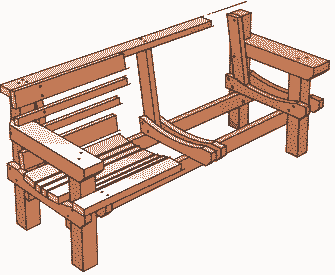 The clean, horizontal lines and rich
redwood tones of this bench design reflect the simple beauty of Northern
California. Comfortable and elegant with a gracefully curved seat and angled
backrest, it offers a standing invitation to sit, relax and enjoy. This
freestanding bench uses Construction Common or Deck Common redwood grades that
have a pleasing mix of heartwood and sapwood. Where increased decay resistance
is needed, use all-heartwood grades: Construction Heart or Deck Heart. Use only
corrosion-resistant deck screws to prevent staining. Counter-sink and plug screw
attachments.
The clean, horizontal lines and rich
redwood tones of this bench design reflect the simple beauty of Northern
California. Comfortable and elegant with a gracefully curved seat and angled
backrest, it offers a standing invitation to sit, relax and enjoy. This
freestanding bench uses Construction Common or Deck Common redwood grades that
have a pleasing mix of heartwood and sapwood. Where increased decay resistance
is needed, use all-heartwood grades: Construction Heart or Deck Heart. Use only
corrosion-resistant deck screws to prevent staining. Counter-sink and plug screw
attachments.
|
Materials for
Benches
|
| |
Quantity
|
Size
|
Length
|
Top, Seat and
Backrest Rails
|
6 |
2x4 |
6 feet |
Seat and Backrest
Rails
|
6 |
2x2 |
6 feet |
Main Braces
|
2 |
2x4 |
5 foot 9 inches
|
Seat and Backrest
Supports
|
9 |
2x4 |
26 inches
|
Front Legs
|
2 |
4x4 |
20-1/2 inches
|
Back Legs
|
2 |
4x4 |
30-1/2 inches
|
Armrests
|
2 |
4x6 |
26 inches
|
Deck Screws
|
1-1/2 pounds
|
3 and 4
inches |
Trim and Notch the
Armrests
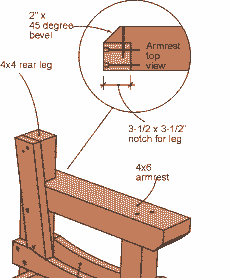 Start building the bench by trimming
and notching the armrests. Trim the front end of each 4x6 armrest at a 45 degree
angle, beginning 1-1/2 inches down from top. Notch the inside back of each
armrest where it will wrap the rear leg. Finish with a 45 degree bevel cut. See
armrest detail.
Start building the bench by trimming
and notching the armrests. Trim the front end of each 4x6 armrest at a 45 degree
angle, beginning 1-1/2 inches down from top. Notch the inside back of each
armrest where it will wrap the rear leg. Finish with a 45 degree bevel cut. See
armrest detail.
Prepare the Legs
 Using 4-inch screws, attach armrests
to 4x4 rear legs 24 inches up from the bottom. Attach armrests to front legs by
driving two screws through the armrest and into the top of the leg.
Using 4-inch screws, attach armrests
to 4x4 rear legs 24 inches up from the bottom. Attach armrests to front legs by
driving two screws through the armrest and into the top of the leg.
Main Braces
 Trim 2x4s for the main braces and
attach to inside front and rear legs 11 inches from bottom.
Trim 2x4s for the main braces and
attach to inside front and rear legs 11 inches from bottom.
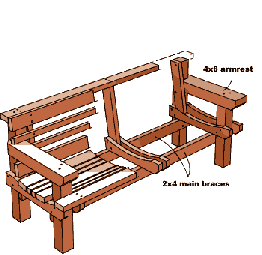 Seat Supports
Seat Supports
The curved seat
supports are made up of 2x4 lumber sandwiching either the 4x4 rear legs or the
single 2x4 backrest support. To shape the curve, make a template for a 36-inch
radius cut. Mark the cut to start 3 inches in from the front. Use a bandsaw to
cut the radius to a depth of no more than 1-1/4 inches.
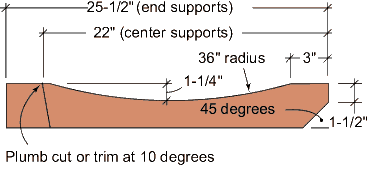 Finish the seat supports
with a 45 degree bevel cut to match the armrests. Note that the end and center
seat supports differ slightly in length and attachments. End seat supports Trim
four 2x4s to 25-1/2 inches. Attach the inside seat supports to the rear and
front legs so they rest on the top edge of the 2x4 main braces. Attach the
outside seat supports level with the inside ones.
Finish the seat supports
with a 45 degree bevel cut to match the armrests. Note that the end and center
seat supports differ slightly in length and attachments. End seat supports Trim
four 2x4s to 25-1/2 inches. Attach the inside seat supports to the rear and
front legs so they rest on the top edge of the 2x4 main braces. Attach the
outside seat supports level with the inside ones.
Center Seat
Supports
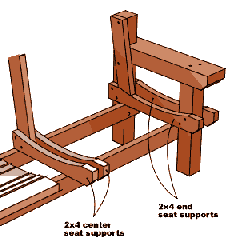 Trim the two center seat
supports to 22 inches. Using a scrap piece of 2x4 as a temporary spacer for the
backrest, attach these seat supports across the main braces flush with the back
edge of the rear brace. Use two 3-inch screws for each joint, angled from below
and inside. Remove the spacer.
Trim the two center seat
supports to 22 inches. Using a scrap piece of 2x4 as a temporary spacer for the
backrest, attach these seat supports across the main braces flush with the back
edge of the rear brace. Use two 3-inch screws for each joint, angled from below
and inside. Remove the spacer.
Backrest Supports
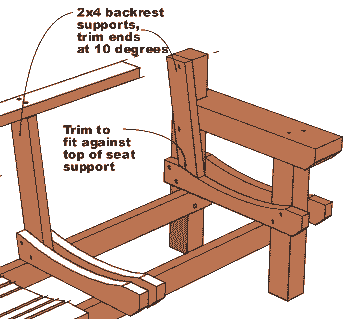 Trim
the 2x4 backrest supports to a 10 degree angle at the top edge. The two end
backrest supports start at the top of the 4x4 rear leg and trim to rest on top
of the seat supports.
Trim
the 2x4 backrest supports to a 10 degree angle at the top edge. The two end
backrest supports start at the top of the 4x4 rear leg and trim to rest on top
of the seat supports.
The center backrest
trims flush to the bottom edges of the two center seat supports. Attach the end
backrest supports to the inside of the 4x4 rear leg with two screws. The bottoms
should fit snugly to the top of the seat supports and can be secured with screws
driven at an angle from below. You should install the top rail before trimming
and attaching the center backrest.
Top Rail
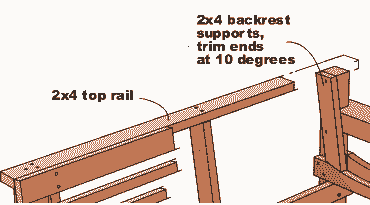 Attach the 2x4 top rail to the
rear legs with three deck screws at each end. Measure and trim the center
backrest. Install between the seat supports and flush to the underside of the
top rail. Secure with screws.
Attach the 2x4 top rail to the
rear legs with three deck screws at each end. Measure and trim the center
backrest. Install between the seat supports and flush to the underside of the
top rail. Secure with screws.
Seat and Backrest
Rails
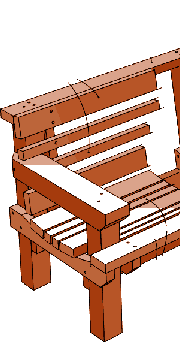 Trim one 2x2 backrest rail to fit
between the armrests. Trim the other 2x2 and 2x4 seat and backrest rails to six
feet. Install the front seat rail so that it overlaps the seat support by 1/2
inch, and attach with two deck screws at each joint.
Trim one 2x2 backrest rail to fit
between the armrests. Trim the other 2x2 and 2x4 seat and backrest rails to six
feet. Install the front seat rail so that it overlaps the seat support by 1/2
inch, and attach with two deck screws at each joint.
 Attach the rear seat rail to
each support with two deck screws. Adjust the spacing of the remaining seat
rails before attaching. Space the backrest rails equally, and attach to supports
with a single screw at each 2x2 and two screws at each 2x4.
Attach the rear seat rail to
each support with two deck screws. Adjust the spacing of the remaining seat
rails before attaching. Space the backrest rails equally, and attach to supports
with a single screw at each 2x2 and two screws at each 2x4.
 The clean, horizontal lines and rich
redwood tones of this bench design reflect the simple beauty of Northern
California. Comfortable and elegant with a gracefully curved seat and angled
backrest, it offers a standing invitation to sit, relax and enjoy. This
freestanding bench uses Construction Common or Deck Common redwood grades that
have a pleasing mix of heartwood and sapwood. Where increased decay resistance
is needed, use all-heartwood grades: Construction Heart or Deck Heart. Use only
corrosion-resistant deck screws to prevent staining. Counter-sink and plug screw
attachments.
The clean, horizontal lines and rich
redwood tones of this bench design reflect the simple beauty of Northern
California. Comfortable and elegant with a gracefully curved seat and angled
backrest, it offers a standing invitation to sit, relax and enjoy. This
freestanding bench uses Construction Common or Deck Common redwood grades that
have a pleasing mix of heartwood and sapwood. Where increased decay resistance
is needed, use all-heartwood grades: Construction Heart or Deck Heart. Use only
corrosion-resistant deck screws to prevent staining. Counter-sink and plug screw
attachments.  Start building the bench by trimming
and notching the armrests. Trim the front end of each 4x6 armrest at a 45 degree
angle, beginning 1-1/2 inches down from top. Notch the inside back of each
armrest where it will wrap the rear leg. Finish with a 45 degree bevel cut. See
armrest detail.
Start building the bench by trimming
and notching the armrests. Trim the front end of each 4x6 armrest at a 45 degree
angle, beginning 1-1/2 inches down from top. Notch the inside back of each
armrest where it will wrap the rear leg. Finish with a 45 degree bevel cut. See
armrest detail.  Using 4-inch screws, attach armrests
to 4x4 rear legs 24 inches up from the bottom. Attach armrests to front legs by
driving two screws through the armrest and into the top of the leg.
Using 4-inch screws, attach armrests
to 4x4 rear legs 24 inches up from the bottom. Attach armrests to front legs by
driving two screws through the armrest and into the top of the leg.  Trim 2x4s for the main braces and
attach to inside front and rear legs 11 inches from bottom.
Trim 2x4s for the main braces and
attach to inside front and rear legs 11 inches from bottom.  Seat Supports
Seat Supports  Finish the seat supports
with a 45 degree bevel cut to match the armrests. Note that the end and center
seat supports differ slightly in length and attachments. End seat supports Trim
four 2x4s to 25-1/2 inches. Attach the inside seat supports to the rear and
front legs so they rest on the top edge of the 2x4 main braces. Attach the
outside seat supports level with the inside ones.
Finish the seat supports
with a 45 degree bevel cut to match the armrests. Note that the end and center
seat supports differ slightly in length and attachments. End seat supports Trim
four 2x4s to 25-1/2 inches. Attach the inside seat supports to the rear and
front legs so they rest on the top edge of the 2x4 main braces. Attach the
outside seat supports level with the inside ones.  Trim the two center seat
supports to 22 inches. Using a scrap piece of 2x4 as a temporary spacer for the
backrest, attach these seat supports across the main braces flush with the back
edge of the rear brace. Use two 3-inch screws for each joint, angled from below
and inside. Remove the spacer.
Trim the two center seat
supports to 22 inches. Using a scrap piece of 2x4 as a temporary spacer for the
backrest, attach these seat supports across the main braces flush with the back
edge of the rear brace. Use two 3-inch screws for each joint, angled from below
and inside. Remove the spacer. Trim
the 2x4 backrest supports to a 10 degree angle at the top edge. The two end
backrest supports start at the top of the 4x4 rear leg and trim to rest on top
of the seat supports.
Trim
the 2x4 backrest supports to a 10 degree angle at the top edge. The two end
backrest supports start at the top of the 4x4 rear leg and trim to rest on top
of the seat supports. Attach the 2x4 top rail to the
rear legs with three deck screws at each end. Measure and trim the center
backrest. Install between the seat supports and flush to the underside of the
top rail. Secure with screws.
Attach the 2x4 top rail to the
rear legs with three deck screws at each end. Measure and trim the center
backrest. Install between the seat supports and flush to the underside of the
top rail. Secure with screws.  Trim one 2x2 backrest rail to fit
between the armrests. Trim the other 2x2 and 2x4 seat and backrest rails to six
feet. Install the front seat rail so that it overlaps the seat support by 1/2
inch, and attach with two deck screws at each joint.
Trim one 2x2 backrest rail to fit
between the armrests. Trim the other 2x2 and 2x4 seat and backrest rails to six
feet. Install the front seat rail so that it overlaps the seat support by 1/2
inch, and attach with two deck screws at each joint.  Attach the rear seat rail to
each support with two deck screws. Adjust the spacing of the remaining seat
rails before attaching. Space the backrest rails equally, and attach to supports
with a single screw at each 2x2 and two screws at each 2x4.
Attach the rear seat rail to
each support with two deck screws. Adjust the spacing of the remaining seat
rails before attaching. Space the backrest rails equally, and attach to supports
with a single screw at each 2x2 and two screws at each 2x4.